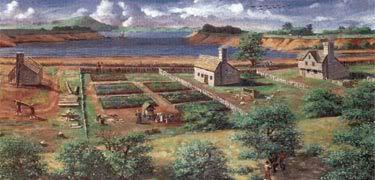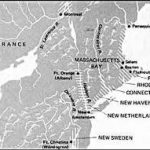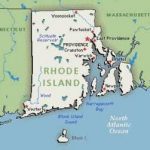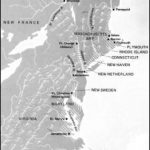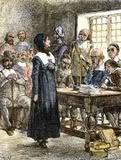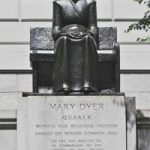Wife of Roger Williams: Founder of Providence Plantation
Image: Providence Plantation in Rhode Island in 1650
Little is known about Mary, so I will tell her story through her husband’s life. Roger Williams was born December 21, 1603 near London, England. He was a student of theology and languages, and was educated at Cambridge University. After suffering a painful rejection by the woman he had chosen to marry, the young clergyman became ill with fever and was nursed back to health by Mary Barnard, the daughter of the Reverend Richard Barnard of Nottinghamshire.
Mary Barnard married Roger Williams on December 15, 1629, in Essex, England. The couple set sail on board the Lyon in December 1630, arriving in Boston, Massachusetts, on February 5, 1631. During the following years, Mary gave birth to six children.
Roger Williams had become a Separatist and refused to join the church at Boston, telling the startled Puritan elders that he would not serve a congregation that recognized the Church of England. This enraged the Boston magistrates.
In April, Williams was called as minister to Salem, Massachusetts, but pressure by the Boston magistrates on the Salem authorities caused him to leave there in late summer and go to Plymouth Colony. There he was made welcome by the Separatist Pilgrims, and was admitted as a member of their church.
Roger held positions as minister at various churches, but his religious beliefs were always considered radical. His belief that religion should not be imposed on citizens, and that Church and State should be separate entities was fine with the Pilgrims, but his views about the Native Americans and their land rights were not.
The Williams family returned to Salem in 1633. When Williams expressed the opinion that Massachusetts Bay Colony’s charter was a breach of the rights of the native population, the Massachusetts magistrates found him guilty of spreading “new and dangerous opinions.”
Banished
Roger Williams was given a decree of banishment October 9, 1635, because of his hostility toward the Church of England. He was ordered by the General Court to leave Massachusetts and was threatened with deportation back to England if he did not renounce his convictions. But he continued to express his controversial opinions.
Officials were sent to Salem to apprehend him, but he was gone. Warned by John Winthrop, he had hastily said goodbye to his wife and baby daughters and sought sanctuary with his friends in the Narragansett Tribe.
On land given to him by the Narragansett sachem (chief), Canonicus, in 1636 Williams founded Providence Plantation, believing that God had brought him and his followers there. Plantation was used in the 17th century as a synonym for settlement or colony. He named the other islands in the Narragansett Bay after virtues: Patience Island, Prudence Island and Hope Island.
In Providence all peoples and religions were welcome. It soon became a safe haven for groups ranging from Quakers to Baptists to Jews. Williams guaranteed the separation of church and state and made sure that all land purchases were handled properly, and that the native tribes were treated humanely. The first law in America making slavery illegal was passed in Providence on May 18, 1652.
In 1643, when the rights of his colony were coming under threat from its larger neighbors, Williams returned to England and secured a charter for the colony of Providence Plantation of Narragansett Bay, which also included Portsmouth, Newport and Warwick. It was later named Rhode Island.
He wrote to his wife while abroad:
My dearest love and companion in this vale of tears, I send thee, though in winter, a handful of flowers made up in a little posy, for thy dear self and our dear children to look and smell on, when I, as grass of the field, shall be gone and withered.
At home in Providence after an absence of nearly three years, Roger Williams became President of the colony, an office he held from 1654 to 1658. He also served as Commissioner, Deputy, and on the Town Council for many years.
The royal charter guaranteed complete religious freedom, established a self-governing colony with total autonomy, and strengthened its territorial claims. It was the most liberal charter to be issued by the mother country during the entire colonial era, and it served as Rhode Island’s basic law until 1843.
Despite his efforts to avert it, war with the Native Americans broke out in 1676. Known as King Philip’s War, it was a tragedy for white men and red. Providence, which for years had been spared, was threatened with destruction. Roger Williams went out to meet the invaders, but his arguments failed. He was told that because he was an honest man not a hair of his head would be harmed, but that the city should be burned.
Providence was burned on March 26, 1676. Mary Barnard Williams died that same year.
Roger Williams lived to see Providence rebuilt. He continued to preach, and the Colony grew through its acceptance of settlers of all religious persuasions. He died sometime between January 16 and March 16, 1683. His funeral was attended with such honors as the town could provide, and a salute of guns was fired over his grave.
He was buried in the orchard in the rear of his homestead lot. Many years later, his remains were disinterred and placed in the tomb of a descendant in the North Burial Ground. In 1936, they were sealed within a bronze container and set into the base of the monument erected to his memory on Prospect Terrace.
His statue gazes out over the city where his principles of freedom of thought and worship, separation of Church and State, and equality for all men, regardless of race or creed were first put into practice. He left no great estate of worldly goods, but this was his immortal legacy to the freedom of loving peoples of all the world.
SOURCES
Roger Williams
Rhode Island History
Roger Williams Family Association
